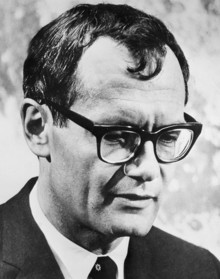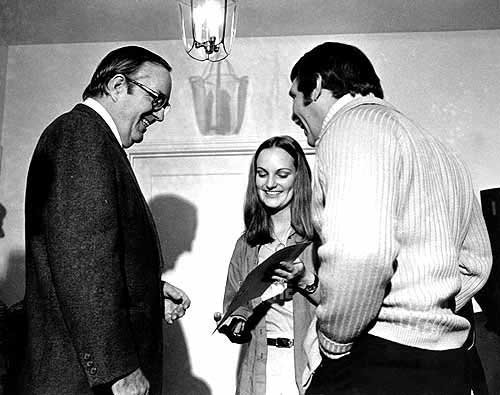Kurt Waldheim had a past, and it caught up to him, if belatedly. The stunning reveal of his Nazi-linked wartime activities was remembered at the time of his death in James Graff’s 2007 Time article “The Skeletons of Kurt Waldheim“:
When I went to visit Waldheim in 1994, he was ensconced in his opulent offices at the Austrian League for the United Nations — but he was still under siege. Freedom of Information Act requests had pried open the 1987 Washington report that put Waldheim on the Justice Department’s “watch list.” The document placed him in Banja Luka in the summer of 1942, when the Nazis had rounded up the city’s Jews and the Wehrmacht was fighting an anti-partisan offensive in the Kozara Mountains to the north. Reprisal killings against civilians were part of the Germans’ brutal efforts to quell armed dissent in the region. The report didn’t prove any direct personal responsibility of Waldheim, who was serving as a quartermaster’s deputy, but its author, Neal Sher, argued that “one doesn’t have to pull the trigger to be implemented in crimes.” Waldheim was having none of that: “unfounded allegations and accusations, with no proof given,” he told me.
The question of guilt in a command structure is no less complex now than it was then; Waldheim was no card-carrying Nazi, but he had been an officer in a unit that had a very dirty war in the Balkans. His clean-vest spiel particularly rankled me because I’d been spending a fair amount of time in Banja Luka myself. Less than a year before my interview with Waldheim, the city’s principal mosque had been totally razed by Serbs, and most of the Muslim population driven out of the city. In the summer of 1992, Serbs in Banja Luka had taken me on a bizarre tour of the camps further west where they held Muslim prisoners. The cruelty of the conflict, the suffering of thousands languishing in refugee camps, had already left a permanent mark on me. Could the conflict have been any less gutting in 1942?•
Before the Waldheim Affair became an international fiasco during the 1980s and he was banned from the United States, the future Austrian president with the Nazi past spoke with PBS talk show host James Day in New York in 1973.
_______________________
In a science-centric 1978 issue of Penthouse, a periodical published by the leathery beaver merchant Bob Guccione, there’s an interview by Richard Ballad with the late NASA astronomer Robert Jastrow, who possessed an interesting mix of beliefs. A staunch supporter of the Singularity, he saw computers as a new lifeform, and he was also a denier of human-made climate change. An excerpt:
Robert Jastrow:
I say that computers, as we call them, are a newly emerging form of life, one made out of silicon rather than carbon. Silicon is chemically similar to carbon, but it can enter into a sort of metal structure in which it is relatively invulnerable to damage, is essentially immortal, and can be extended to an arbitrarily large brain size. Such new forms of life will have neither human emotions nor any of the other trappings we associate with human life.
Penthouse:
You use the term life to describe what we usually think of as lifeless creatures. One might call them “computers with delusions of grandeur.” How can you say they are a form of life?
Robert Jastrow:
They are new forms of life. They react to stimuli, they think, they reason, they learn by experience. They don’t, however, procreate by sexual union or die — unless we want them to die. We take care of their reproduction for them. We also take care of their food needs, which are electrical. They are evolving at a dynamite speed. They have increased in capabilities by a power of- ten every seven years since the dawn of the computer age, in 1950. Man, on the other hand, has not changed for a long time. By the end of the twentieth century, the curves of human and computer growth will intersect, and by that time, I am confident, quasi-human intelligences wilt be with us. They will be similar in mentality to a fresh- ly minted Ph.D.: very strong, very narrow, with no human wisdom, but very powerful in brute reasoning strength. They will be working in combination with our managers, who will be providing the human intuition. Silicon entities will be controlling and regulating the complex affairs of our twenty-first-century society. The probability is that this will happen virtually within our own lifetime, What happens in the thirtieth century, or the fortieth? There are 6 billion years left before the sun dies, and over that long period I doubt whether biological intelligence will continue to be the seat of intelligence for the highest forms of life on this planet. Nor do I think that those advanced beings on other planets, who are older than we are, if they exist, are housed in shells of bone on a fish model of carbon chemistry Silicon, I think, is the answer. …
Penthouse:
Will humans as we know them die out like the dodo?
Robert Jastrow:
It may be that a symbiotic union will exist between humans and new forces of life, between biological and nonbiological intelligence — and it may now exist on other planets. We might continue to serve the needs of the silicon brain while it serves ours.
Penthouse:
Do you think that the computer beings will triumph in the end?
Robert Jastrow:
Yes. Not “triumph” in the sense of a war but triumph in the same sense that the mammals triumphed over the dinosaurs. It will be the next stage of perfection.•
Jastrow discussing his ideas about the Big Bang and theology:
________________________
The 1970s video below has comments by Randolph Hearst made to NBC News about his daughter Patty, who was at the time doing a walkabout through the Radical Left. The heiress was kidnapped by the Symbionese Liberation Army, (perhaps) brainwashed, and ultimately joined in the group’s acts of domestic terrorism. “I think she’s staying underground just like a lot of kids stay underground,” her father said, accurately assessing the situation. Before the end of the decade, she was captured, convicted, imprisoned and saw her sentence commuted. In January 2001, Bill Clinton granted her a full pardon.



